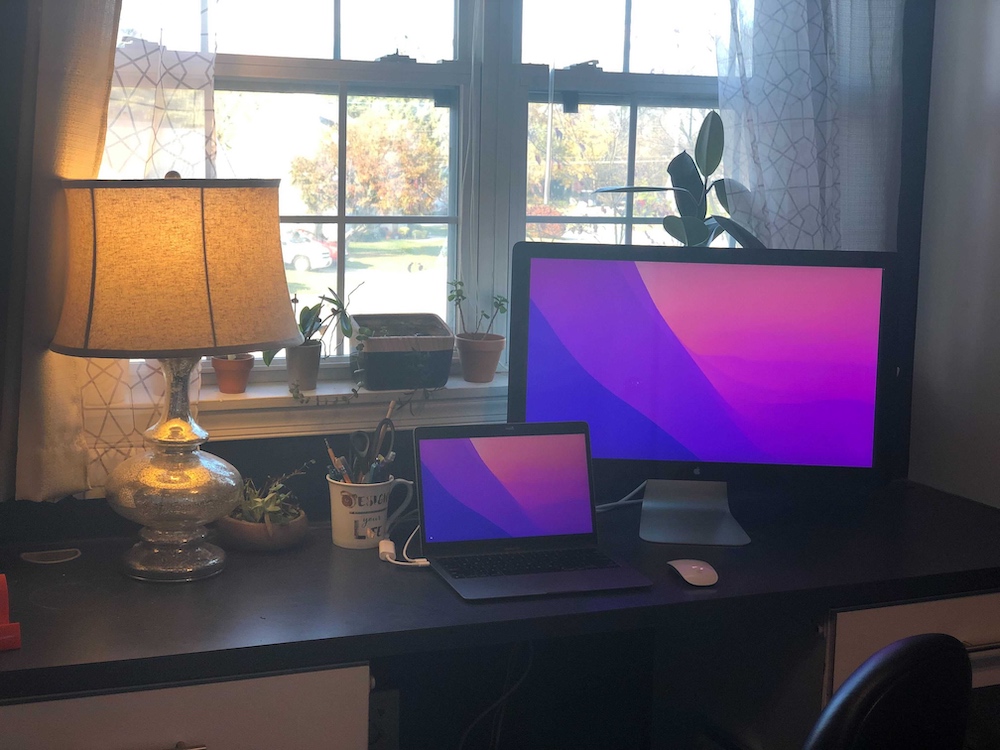That’s starting to change.
There was a time not that long ago when rural (or rural-adjacent) living was incompatible with remote work. Even as recently as 2021, a remote-working software developer in Georgetown said he sometimes faced internet connection challenges.
“I’m hoping the high-speed broadband will come down a little bit more to Georgetown,” Jeremy Sabina, an engineer for CSC, said in that 2021 interview with Technical.ly. “The service here is a little bit rougher, and that’s something I’ve been dealing with.”
As infrastructure upgrades in Delaware continue to take us closer to 100% high-speed broadband coverage, more downstaters are opening up their job prospects to companies all over the world that hire remote employees.
That means no commutes (or, in some cases, very occasional commutes to a HQ in Wilmington, New York or DC), more family time, and the ability to live near the beach or in the country, without the disadvantage of a limited number of well-paying non-agricultural jobs.
Spurred by the COVID-19 pandemic, remote work is economically impacting small towns across the US, making more employment accessible in areas that have seen a drop in manufacturing jobs. And while so-called “Zoom towns” — aka places that became popular spots for outdoorsy remote workers to relocate to in the mountains, countryside or tropics — are seen as more of a gentrified blight than a boom by some, downstate Delaware’s lack of trendiness has so far kept it from being overwhelmed as the number of work-from-home technologists and other professionals rises.
They’re here
Most people upstate, itself a remote work hub, know little about the growing community of remote employees in Kent and Sussex counties — and many of their own neighbors are likewise unaware. While they’re not hiding what they do, they have sort of secret lives in environments that lack resources like coworking spaces and frequent happy hour networking mixers.
Technical.ly talked to three downstate remote workers to get their view of remote work from below the Canal, as well as some advice for others looking to land a remote job while living in a more remote area.
Jess Spellman of Milford works for a large ecommerce retailer as a senior recruiter within talent acquisition.
“Our corporate headquarters is out of state but the company is nationwide,” she said. “However, there are no offices or distribution centers within Delaware so I knew I would only realistically be able to be considered for a remote opportunity. Thankfully, a large portion of their global talent acquisition team does sit remotely so it is something they are accustomed to.”
Andrea W. lives in central Delaware, and works remotely as an account executive for impact.com doing remote marketing technology sales.
“We work with companies like Airbnb and Walmart, but my niche is focused on small businesses, on startups or companies with under 50 people, which is cool, because for me, that’s my background,” she said. “I worked for an app before where I was the 12th employee, I worked for another company that was focused on improving diversity in tech in Boston. … So this is my space, and it’s really fun to give.”
Xavier Hopkins lives in Kent County and is an account manager for Bucket Listers, a New York City startup that curates lists of things to do in cities around the world.
“They’re transitioning and scaling now,” he said. “My job as an account manager is to make sure that the partners that we sign up for our media campaigns are getting all that they expect. And I ensure that anything that they need from us, or anything that our company needs from them, I take care of.”

Andrea W’s remote work setup in central Delaware. (Courtesy photo)
The challenges of working remotely downstate
Now that broadband is more stable than it used to be in Delaware’s more rural areas, at least according to the people we talked to, the biggest challenge by far is professional isolation.
“Working in Boston, they had so many coworking spaces and places like cafes where I could go,” Andrea said. “Honestly, other than, like, House of Coffi [in Dover], I don’t know where I would go to and work except over to a friend’s house. A space that I have seen used for business meetings is Habitat for Humanity. I think a coworking space down here would have to have a dual purpose.”
Spellman admits that the lack of casual office chatting makes it harder to form connections.
“You have to be purposeful with your internal connections and meetings to gain exposure to leadership/stakeholders that may not be on your immediate team that you don’t work with on a day-to-day basis,” she said. “This can be a challenge, as it is not as natural as when you are in an office. You have the ability to say hello and have that ‘water cooler’ talk when you are face to face, but when you’re remote you have to be more strategic.”
Hopkins just wants to be seen, as remote workers downstate are often overlooked, leaving little to draw new people to add to its remote worker community: “As it currently stands, the feeling is that there’s not very much here,” he said.
That leaves downstate remote workers on their own when it comes to local networking — but the more they learn that there are others in the same boat, the more they’ve begun to reach out to each other.
The benefits of working remotely downstate
Remote work is known for being ideal for people who love living in a more rural or coastal environment, but hate to commute. It can help make downstate housing developments, which tend to cost less than upstate developments, feasible. And, for some, downstate is simply home — though one that is not always flush with well-paying local jobs.
“I went from commuting two-plus hours a day to getting that time back in my life, and it is wonderful,” Spellman said. “I can run to the grocery store or run a load of laundry in the middle of my day. And the time I get back with my family is the most valuable thing. I can now participate in daycare drop off or pick up, when before, I was lucky if I got home 30 minutes before my kids went to bed.”
Cutting commuting and adding to family life became more important to Andrea after COVID gave her a taste of working at home.
“I started all of my early-career positions going to the office every day,” she said. “I’ve battled DC traffic, I’ve driven to jobs and taken the bus … and then, once COVID hit, I took a remote job which intended to return to the office in Boston. And then it didn’t, and I found success and peace of mind with remote work. Then with growing a family and everything, it just made sense to pursue remote positions.”
Getting hired as a remote worker when you’re far from the city
Searching for a remote job can be increasingly competitive, especially as some large companies enforce back-to-the-office rules — but research says that remote work is here to stay.
“What’s a true remote job? If it’s one with mandatory attendance, then it’s not technically remote,” Andrea said. “My job is 100% remote. Anything that I need to go into the company [office] for, they are gonna pay for, but it will still be optional.”
Recruiters found her and offered her a job, which may makes it sound like it just landed in her lap. But that good luck actually took quite a bit of work.
“Things that look like they come easy usually come with a background,” she said. “The preparation that I did to get a remote position included doing networking events online. I went to conferences, I looked at companies and applied for lots of different places. I signed up for training programs that were specifically for my [tech sales] position that then connected me to jobs or position, and I optimized my LinkedIn with keywords and everything so that when that recruiter went to find someone like me, that was already on my profile.”
Though it’s a generalization, some CEOs in the region look for remote workers in places like Delaware because of the perceived stability of people who live in Kent and Sussex counties. They may have families here and no intention of moving, whereas more urban millennials may be perceived as likely to hop from job to job.
The small network Hopkins did have helped him land the job at Bucket Listers when he was working semi-remotely for a home security company. In fact, it was Andrea who noticed that the startup was hiring on LinkedIn and connected him to its director of people operations.
Having experience is helpful, Spellman said — and as much as younger workers might want to jump right into remote work (and some are), starting a career by working in an office might be an effective pathway to remote work a few years down the line.
“Becoming a full-time remote associate was a complete game changer in my life for the better, but I do recognize the significant benefits for being in an office,” she said. “I feel entry-level associates should take advantage of that time being in an office. You learn such valuable skills having those face-to-face interactions and exposure to other associates. I am more established in my career today, which is one of the reasons I feel I can be so successful remote. I don’t know if I would be where I am today if I started off my career as a remote employee.”
_
Are you a remote worker in downstate Delaware? Share your experience by emailing delaware@technical.ly.
Join the conversation!
Find news, events, jobs and people who share your interests on Technical.ly's open community Slack

Delaware daily roundup: Equity Action Summit video; DE Senate debates wind energy; Hydrogen hub listening sessions

Delaware daily roundup: Early-stage loan help; Jobless rate drops below 4%; $700k grant for industrial park

Delaware daily roundup: Greentech terms to know post-Earth Day; generative AI's energy costs; anti-AI deepfake legislation


